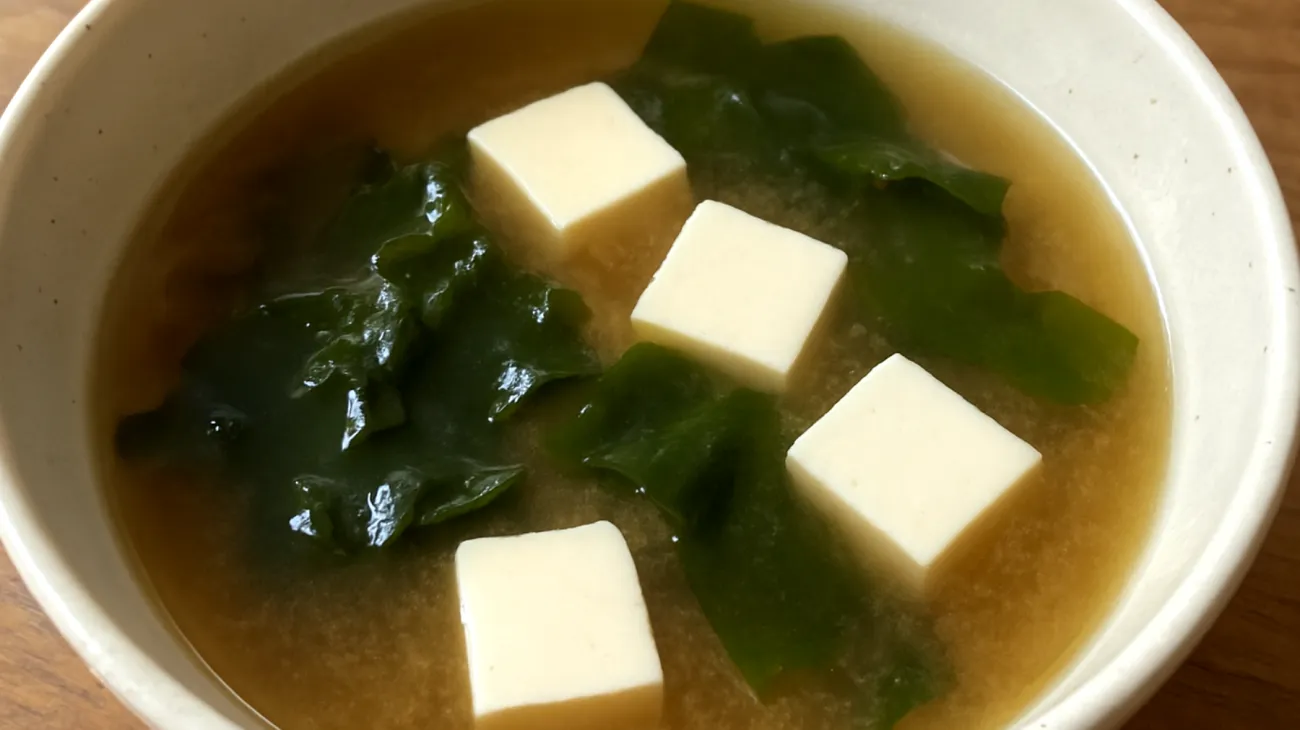The familiar 3 PM energy crash hits like clockwork – your eyes grow heavy, concentration wavers, and that third cup of coffee suddenly seems essential. Before reaching for another caffeine fix, consider how traditional Japanese wisdom might offer a more sustainable solution. Miso soup with wakame seaweed and silken tofu represents far more than a simple bowl of broth; it’s a carefully orchestrated symphony of nutrients specifically designed to combat the metabolic challenges of modern desk-bound lifestyles.
The Science Behind Sustained Energy
Unlike the quick spike and inevitable crash of processed snacks, this humble soup delivers what nutrition scientists call “metabolic stability.” The fermented miso paste contains living probiotics that actively support your gut microbiome. These beneficial bacteria help restore gut microbiota variety, which research has linked to improved mood and stress responses through gut-brain signaling. While some claim that fermented foods directly produce neurotransmitters, the truth is more nuanced – they modulate production through complex gut-brain interactions that influence your ability to maintain focus and emotional balance during demanding work periods.
The silken tofu contributes complete proteins containing all nine essential amino acids, providing your body with steady building blocks for sustained energy production. Clinical data indicates that diets higher in plant proteins are associated with better glycemic control and satiety than diets high in simple carbohydrates. This balanced protein intake helps regulate blood sugar levels throughout the day, preventing those dramatic afternoon energy dips that plague office workers worldwide.
Wakame: The Ocean’s Mineral Powerhouse
This emerald seaweed brings an impressive arsenal of nutrients often missing from land-based diets. Iodine content in wakame supports optimal thyroid function – your body’s metabolic control center. When your thyroid operates efficiently through proper iodine intake, you experience more consistent energy levels throughout the day rather than the rollercoaster peaks and valleys common with irregular eating patterns.
Wakame also provides substantial amounts of magnesium, a mineral that over 50% of U.S. adults consume in insufficient quantities. Magnesium deficiency has been linked to increased fatigue, muscle cramps, and impaired concentration – symptoms remarkably similar to what sedentary workers experience daily.
Bioactive Compounds for Cognitive Enhancement
Beyond basic nutrition, wakame contains unique compounds called fucoxanthin and alginate. Fucoxanthin has demonstrated anti-inflammatory properties and may help regulate metabolism while supporting cognitive function. Population studies in Japan suggest that regular seaweed consumption correlates with lower rates of cognitive impairment in older adults. While direct causality hasn’t been definitively established, these findings align with broader research on the cognitive benefits of nutrient-rich marine foods.

Digestive Harmony for Irregular Eaters
Sedentary professionals often struggle with erratic meal timing, rushed lunch breaks, and stress-induced digestive discomfort. The fermented miso provides probiotic microorganisms, notably Lactobacillus and other lactic acid bacteria, that help restore gut balance disrupted by poor diets or stress.
The warm, liquid format of miso soup offers another advantage – it’s easier to digest than raw, fibrous meals for individuals experiencing stress-related digestive symptoms. The combination of probiotics from miso and easily digestible proteins from silken tofu creates an environment that supports nutrient absorption, ensuring your body actually utilizes the vitamins and minerals you’re consuming.
Strategic Preparation and Timing
The beauty of miso soup lies in its adaptability to busy schedules. Here are key preparation strategies for maximum benefit:
- Prepare large batches on weekends, storing portions in glass containers for quick reheating
- Choose low-sodium miso varieties to avoid excessive salt intake, particularly important for desk workers who already face elevated blood pressure risks
- Add fresh wakame and tofu to reheated broth to preserve nutrients and texture
- Time consumption as a mid-morning snack or light lunch for sustained afternoon energy
Protein- and micronutrient-rich snacks have been shown to stabilize blood sugar and concentration better than sugary alternatives. The warm temperature also contributes to comfort and satiety, potentially promoting better nutrient absorption and mental clarity during those crucial afternoon hours when productivity typically wanes.
Important Considerations for Optimal Benefits
While miso soup offers remarkable benefits, moderation remains key. Limit consumption to 1-2 servings daily due to sodium content, even in low-sodium varieties, as excessive sodium increases hypertension risk. Individuals with thyroid conditions should consult healthcare providers before incorporating regular wakame consumption, since high iodine intake can exacerbate certain thyroid problems.
The synergistic effect of combining all three ingredients – miso, wakame, and tofu – likely results in greater nutritional benefit than relying on individual components. This principle, supported by research in nutritional synergy, demonstrates that whole-food combinations often have greater health effects than isolated nutrients.
Transform your afternoon energy slump from an inevitable burden into an opportunity for nourishment. This ancient soup offers modern solutions for contemporary challenges, providing the sustained vitality needed to excel in demanding professional environments while supporting long-term health and cognitive function. Rather than fighting your body’s natural rhythms with caffeine crashes, work with them using time-tested nutritional wisdom.
Table of Contents

